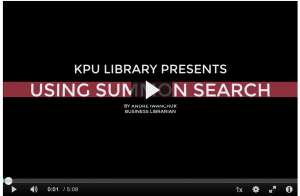8 Task 4: Conducting Your Research
Andre Iwanchuk
Learning Objectives
By the time you complete this task, you will be able to
- Use business databases to find relevant articles for your report
- Access additional help from a business librarian
Conducting Basic Library Searches
There are many ways to find information on a topic. The library homepage provides access to Summon Search, the Library Catalogue, Research Databases, KORA, and Journal Titles.
- SUMMON SEARCH: “everything”
Searches just about everything Kwantlen library has to offer – books, articles, and more. This is a great place to start your research.
- CATALOGUE: books, e-books and multi-media only
Searches the Library’s book and multimedia collection – books, e-books, online videos, DVDs.
- RESEARCH DATABASES: individual databases
Provides a list of all the databases to which Kwantlen subscribes. Research databases provide access to journal citations and full text articles.
- JOURNAL TITLES: Determines if full text access to a journal is available.
This is particularly useful if you have a list of journal articles you want to find.
Watch these videos to learn how to find great
https://libguides.kpu.ca/busi/businessresearchvideos
Click on the video below to access videos
RESEARCH DATABASES
These databases might be good places to start your search for your project
Business Source Complete: Comprehensive full text academic and popular articles for all disciplines of business. Also includes access to items such as company profiles, country reports and industry information
Canadian Business & Current Affairs (CBCA) Complete: Full text access to current events and academic information as produced in Canada.
Canadian Newsstream: Full text access to Canadian national and leading regional newspapers.
Academic Search Complete: Interdisciplinary full text database of academic and popular journals covering an extremely wide and deep selection of subjects, topics and article types.
IBISWorld: U.S. and Canadian market research industry reports.
RESEARCH DATABASE SEARCH TIPS:
- Think of concepts and synonyms and use these to generate keywords
- Come up with synonyms and broader/narrower/related terms
- Cycle your search – use your first search results to help focus your next searches
- Find additional articles by looking at subject terms, references, citing articles, authors, and journals
- Use AND, OR, “quotation marks” and the wildcard symbol * to return more relevant search results
- AND – combine concepts (workplace AND communication)
- OR – includes synonyms and related words (workplace OR employee)
- “quotation marks” – use when searching for a phrase (“workplace communication”)
- Truncation * – use for terms with multiple endings (Canad* picks up Canada, Canada’s, Canadian, Canadians etc.)
Helpful KPU Library Resources
SUBJECT GUIDES: Librarians have created guides to useful resources covering a particular subject area. These guides are great for getting an overview of a subject area.
- Business Subject Guide – http://libguides.kpu.ca/busi
RESEARCH STRATEGIES:
http://www.kpu.ca/library/research_strategies
SCHOLARLY PUBLICATIONS (PEER-REVIEW) http://www.kpu.ca/library/databases/scholarly-publications
CITATIONS & PLAGIARISM: http://www.kpu.ca/library/citationsplagiarism
GOOGLE & GOOGLE SCHOLAR SEARCH TIPS:
Try these advanced search operators:
- intitle: (limits search to document title e.g. intitle:”workplace communication”)
- site: (restrict search to specific domain – site:edu, site:gov)
- filetype: (restrict search to a specific file type – filetype:pdf)
HELP:
- Andre Iwanchuk, Business Librarian – Andre.Iwanchuk@kpu.ca / 604.599.3486
- Ask A Librarian / AskAway service (IM with a Librarian) http://www.kpu.ca/library/services/askalibrarian


